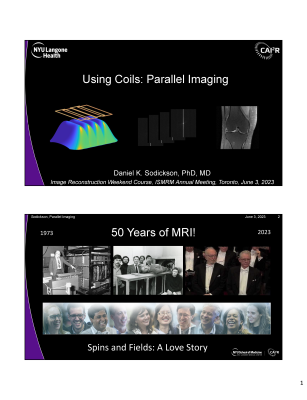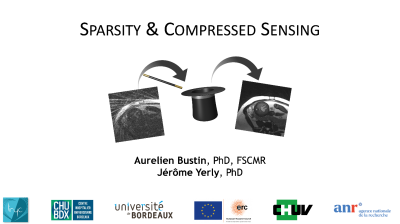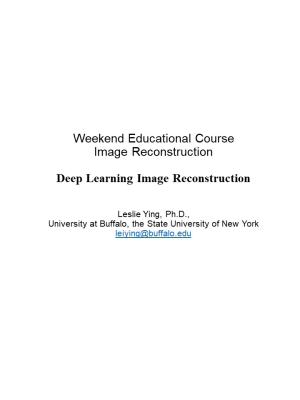Weekend Course
Image Reconstruction
ISMRM & ISMRT Annual Meeting & Exhibition • 03-08 June 2023 • Toronto, ON, Canada

| 13:00 |
Basics: k-Space to Image Space
Holden Wu
Keywords: Image acquisition: Reconstruction MRI data acquisition and reconstruction are linked through the unique concept of “k-space.” This talk will begin with an overview of the MRI signal equation and essential mathematical methods. Next, this talk will introduce k-space and its key characteristics, and then proceed to cover MRI data sampling in k-space and basic MR image reconstruction from k-space data using the Fourier transform. Imaging considerations, such as artifacts due to undersampling, will also be discussed. Finally, this talk will summarize the important role of k-space in MRI and set the stage for advanced reconstruction methods that will be covered in subsequent talks. |
|
| 13:30 |
 |
Using Coils: Parallel Imaging
Daniel Sodickson
Keywords: Image acquisition: Reconstruction, Image acquisition: Fast imaging, Physics & Engineering: Hardware This talk will review the use of radiofrequency (RF) coils for spatial encoding in MRI. RF coils have spatially varying sensitivities to MR signal. As a result, combining information from multiple coils allows spatial discrimination of regions not explicitly separated by magnetic field gradients; or, alternatively, it allows missing data not explicitly encoded with gradients to be filled in. The talk will introduce SMASH, SENSE and GRAPPA parallel imaging approaches as distinct but related fitting problems. It will then place parallel imaging in the broader context of inverse problems to be introduced in subsequent lectures. |
| 14:00 |
Off-the-Grid: Non-Cartesian Sampling
Matthias Stuber
Keywords: Cardiovascular: Cardiac, Cardiovascular: Cardiac function, Image acquisition: Motion Correction Non-rectilinear signal readouts offer both unprecedented challenges and opportunities both on the acquisition and on the reconstruction side. These will be discussed with a particular focus on cardiovascular applications. In this context, fat suppression strategies, 2D imaging, 3D imaging and even excitation k-space will be discussed. |
|
| 14:30 |
 |
Sparsity & Compressed Sensing
Aurelien Bustin
Keywords: Image acquisition: Fast imaging In this presentation, we will delve into the fascinating world of compressed sensing, which allows for measuring less data during imaging procedures. We will explore the three fundamental ingredients of compressed sensing: sparsity, random acquisition, and non-linear reconstruction. We will delve into each component, exploring their implementation and showcasing their remarkable potential in a range of clinical applications. |
| 15:00 |
Break & Meet the Teachers |
|
| 15:30 |
Low-Rank & Structured Low-Rank Methods
Haikun Qi
Keywords: Image acquisition: Reconstruction This talk will first introduce the basics of low-rank methods including low-rank matrices, low-rank approximation and how low-rankness could help to regularize MRI reconstruction. Then, an overview of low-rank MRI reconstruction approaches will be provided including general low-rank and structured low-rank methods. Finally, emerging deep learning based low-rank methods will be briefly introduced followed by a summary of this talk. |
|
| 16:00 |
 |
Deep Learning Image Reconstruction
Leslie Ying
Keywords: Image acquisition: Reconstruction Deep learning, as a powerful tool for artificial intelligent, has attracted a lot of attention in the MRI community. Recently deep learning has shown success in image reconstruction. It has demonstrated some unique benefits over the existing methods. This course will teach the basics of neural network and some existing methods to use deep learning to perform image reconstruction from undersampled k-space data. The benefits, limitations, and outlook for deep learning image reconstruction will also be discussed. |
| 16:30 |
Efficient Forward Models for Image Reconstruction
Matthew Muckley
Keywords: Image acquisition: Reconstruction, Transferable skills: Software engineering This presentation will give an overview on the practical aspects of implementing forward and backward operators for MR image reconstruction. We will cover the high-level details of implementing non-Cartesian compressed sensing reconstruction in PyTorch. Topics covered will include 1) how to convert mathematical operators to code, 2) code execution on the CPU vs. GPU, 3) building linear operations and verifying their correctness, and 4) a final demonstration of reconstruction. Although the implementation focuses on PyTorch, high-level concepts will be extensible to other languages such as MATLAB or Julia, and references will be made to these alternative frameworks where possible. |
The International Society for Magnetic Resonance in Medicine is accredited by the Accreditation Council for Continuing Medical Education to provide continuing medical education for physicians.